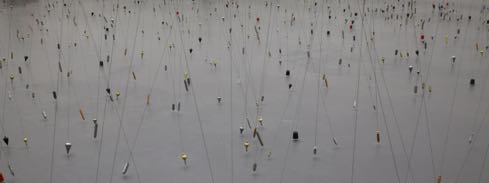
Current PhD projects
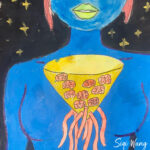 Song Jialing
Song Jialing
Gendering Digital Cultural Production in Chinese Platform Economy (2022-2026)
RED, a Chinese social media platform with nearly 90% of users being female, was initially designed for middle-class women within a frame of globalized consumer culture, playing a prominent role in surging iterative waves of prevailing beauty standards and normative femininities in contemporary China. In public discussions or even less academic discourses, RED is frequently taken as a “successful exemplar” of corporate marketing, without a focus on the imbricate gender power relations of its platform ecosystem.
Drawing upon the literature in postfeminist media studies, platform studies, and gendered digital labor, this project will build up an integrated framework consisting of four dimensions: 1) How did RED accumulate and stabilize a vast number of female users in the Chinese platform economy? 2) What are the visualities, aesthetic forms, and content genres of their gendered and platform-based cultural production? 3) How is RED structured by its infrastructures to afford and mobilize these users for their platform practices? 4) How do Chinese female subjects on RED not only labor but also commit to shaping the community and sociality on digital media platforms?
Centering on the political economy and the user’s practices of RED, this project firstly aims to fill in the gap of a specific gender focus in the process of platformization in China. Besides, I steer away from a common tendency to understand the flow of influence (in the feminization of digital labor) as unidirectionally from the “global” to the “local.” It will contribute to understanding the formation of Chinese gendered subjects vis-à-vis digital cultural production, as well as in what ways they participate in, interact with, and navigate the system of the Chinese platform economy.
Funded by the Chinese Scholarship Council. Supervision together with Tommy Tse.
 Timoteus Anggawan Kusno
Timoteus Anggawan Kusno
Dismantling the Nostalgia: Art Practices Dealing with Colonial Leftovers (2023-2027)
Throughout my doctoral research, I want to examine and reflect on my practice as an artist, dealing with and working on the (de-)colonial issues within the slippery terrain of history. I will dig into the specter of Indonesia’s colonial histories through my art projects, in which I mobilize an ethnographical approach. In this Ph.D. in the arts, I will investigate my practice of working with Indonesian colonial objects, matters, and discourses; including my collaboration with the Rijksmuseum for the “Revolusi!” exhibition, my video art series “Phantoms,” and my long-term project of the ‘fictional’ Centre for Tanah Runcuk Studies.
Funded by by the Ministry of Education, Culture, Research, and Technology of the Republic of Indonesia, through the Beasiswa Pendidikan Indonesia (BPI). Supervision together with Leonie Schmidt.
 Hannah Poon
Hannah Poon
Surviving in Abeyance: Digital Networks and Resistance in Hong Kong after the Anti-Extradition Bill Movement (2022-2026)
How to sustain a political movement when it is not allowed? How to survive in abeyance? Hong Kong’s 2019-20 Anti-Extradition Bill (Anti-ELAB) Movement, a full-scale democratic struggle against Chinese rule, was forced into abeyance under the National Security Law imposed in June 2020. Activist networks have to find their ways of survival by shifting to other arenas that are less controlled by the regime: consumer marketplace, fan culture, and diasporic communities.
Using a mix of ethnographic methods, this project takes these social networks as case studies and asks: what new forms of connection and resistance are enabled by digital technologies after the Anti-ELAB movement has ended, and how these tactics impact political struggles in non-democratic societies like Hong Kong.
This project is supported by a NWO PhD in the Humanities grant. Supervision together with Leonie Schmidt.
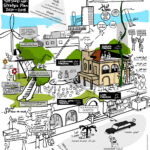 Yazan Khalili
Yazan Khalili
The Institution as a Cultural Practice: Re-imagining Cultural Practices in Palestine (2020-2024)
My PhD project investigates how the financial crisis that followed the Arab Spring and recent changes in the donors’ economy in the Middle East have enabled a reimagining of the structure and role of cultural institutions in Palestine. It focuses on the Khalil Sakakini Cultural Centre (KSCC), where I have worked as chairperson of the board and later as director between 2015 and 2019. Like other Palestinian institutions, the KSCC was hit hard by the economic developments mentioned above. Despite this, these economic misfortunes triggered a process of internal change that transformed the KSCC into a platform for various kinds of institutional experiments, moving it in the direction of an imaginative institutionalism. Building on recent theories of “crisis” as a productive, transformative moment and a permanent feature of the Palestinian condition, I show how a specific crisis opened a window of opportunity for institutional innovation under the specific conditions of the West Bank during the mid- to late 2010s.
How did the financial crisis enable institutional change? What can we learn from this process? I explore the history of the KSCC, from its establishment in 1996 onwards, in the relation to the broader history of Palestinian cultural institutions. I then analyze how the centre responded to the financial crisis, which erupted in 2015, by embracing it. Indeed, I show how the KSCC engaged culturally, economically, and politically with the crisis, situating this response within the Palestinian cultural and political landscape. The project will also include an analysis of the prehistory of these developments, looking at cultural and political mobilization in the region in the 1970s and ’80s. In so doing, I examine how governance, power structures, economics, and social networks have been and still can be challenged and reimagined.
This project is part of the NWO VIDI project IMAGINART. Supervision together with Chiara de Cesari.
 Chen Zhou
Chen Zhou
Imagining the Rural in Contemporary China from a Perspective of Cultural Biographies of Everyday Objects (2020-2024)
Chinese society has been witnessing a ‘rural lifestyle’ in the urban, during the past decade, which incorporates rural elements in the production, consumption and possession of everyday objects. By tracing the biographies of those rural-embedded objects, from production, consumption to possession, this project aims to explore how ‘rural imaginations’ are constructed, examining the way the rural becomes mobilized to influence urban experience and the way urban mobilizations of the rural reflect back on the rural and perpetuate certain imaginations of the rural, while obfuscating aspects of the rural that do not fit into these imaginations.
Affiliated to the ERC funded project Rural Imaginations. Supervision together with Esther Peeren.
 Chuhan Yang
Chuhan Yang
Far more than just a material object or a physical site, heritage is an act of communication and cultural process that has great relevance to memories. It affects how people understand and deal with their past and how they construct identities and ideas of the future. In the acts of memory that are performed by individuals or collectives in a community in the present, the past is continuously modified, reconfigured, retold, and consequently adopted as part of the present and has impacts on the future.
Commonly related to the cultural legacy of major conflict and traumatic events, dissonate heritage has developed new perspectives for heritage studies. Not limited to telling discordant stories and representing a controversial past, dissonate heritage is an encounter with and a representation of a difficult past in cultural forms that reveals the tension and negotiation among different discourses and creates space for heterogeneous actions. In this sense, it is arguable that heritage dissonance is an intrinsic nature of all heritage.
This project is conducted with four case studies (e.g., the ruins of Yuanmingyuan, the bomb sites during the Second Sino-Japanese War, the abandoned industrial area of Northeast China, and the ruins of the Wenchuan earthquake). Subjects in different phases of modern and contemporary China are investigated to explore the ever-changing values attached to the dissonant heritage. It aims to reveal how the difficult past has been remembered or failed to be a part of constructions of remembrance, and how different groups have used these legacies of the past to construct their identities and carry out actions at present and towards the future.
Funded by the Chinese Scholarship Council. Supervision together with Ernst van Alphen.
 Ke Ma
Ke Ma
Who is White? Race-making in Chinese visual cultures (2020-2024)
Research on race in Euro-American visual cultures has proven to effectively reveal the media’s crucial role in formulating, normalizing, and contesting white superiority in Western contexts. With the rise of China as a global economic powerhouse and the increasing diversity of its international migrant populations and their representations in Chinese media, it is high time to examine the shifting meanings of race and whiteness from a Chinese perspective.This PhD project employs ethnography and media analysis methods to explore how multiple versions of whiteness-centered racial identities are articulated and negotiated in Chinese cinema, Chinese social media, and the fashion modeling industry in China. Four research questions frame this project. First, how racialized aesthetic and affective labor is performed by foreign actors, models, and vloggers under the Chinese gazes? Second, how does Chinese nationalism manifest in the racialization of foreign actors, models, and vloggers? Third, how do gender and class intersect with race in these cases? Fourth, how does the COVID-19 pandemic impact foreigners’ positionalities in China? And how does it reshape Chinese perceptions of race and whiteness?
Part of the ERC project ChinaWhite – “The reconfiguration of whiteness in China: Privileges, precariousness, and racialized performances.”
Supervision with Lan Shanshan and Rachel Spronk.
 Jori Snels
Jori Snels
Gazing Ahead: China’s Imagined Futures in Digital Art (2019-2024)
China has recently been leapfrogging into a digital future, developing new digital technologies to strengthen its economic and geopolitical power in order to achieve Xi Jinping’s utopian ‘China Dream’. On the other hand, anxiety exists in the West about a dystopian Chinese future in which digital technology is used to censor, control, and reform a citizenry and the world at large. This PhD-project starts from the assumption that besides the Western doom scenario and the state-endorsed ‘China Dream’ other, more nuanced pictures of China’s future exist. It breaks new ground by (1) analyzing the kind of futures aspired to and anticipated (Appadurai 2013) in Chinese digital art, which is particularly active in imagining different futures for China; and (2) determining what the social and political implications of these futures are.
The project focuses on three themes that play a crucial role in Chinese digital art’s imagination of the future: Hyper-Urbanization, Body Modification, and Surveillance. Object-oriented ontology and posthuman theory are used to analyze the destabilized ontological boundaries between humans and digital technologies, which are transforming everyday life in China and structure Chinese imaginations of the future.
A more substantial understanding of China’s imagined futures will benefit the study of Chinese digital art and Chinese society, as well as art theory and Sino-Western political policy. Digital art is an important area to study in this regard because it is particularly adept at reflecting existing imaginations of the digitized future, as well as creating new ones.
This project is supported by a NWO PhD in the Humanities grant. Supervision together with Esther Peeren.
 Yvette Lok Wee Yong
Yvette Lok Wee Yong
Wenyi and Its Discontents: A Study of Creative Practices and Politics in Hong Kong (2019-2023)
Recently large protests have erupted around the world with masses taking to the streets calling for change. With the return to China looming in 2047, in Hong Kong the future is increasingly seen as dystopian. How to deal with a bleak future creatively? While scholars studied protests movements and their global appeal, less is known about the role of creativity in these protests. This project explores the relations between creativity, youth, and politics in Hong Kong by zooming in on wenyi qingnian – local young creative practitioners involved in the protests. The project asks how wenyi qingnian’s creative practices – ranging from flash mobs to art, and from music to poetry – and politics intersect during the 2019 protests. To understand the relations between creative practices, youth culture and politics, the project focuses on: (1) the parallels between today’s wenyi qingnian and past generations, (2) how wenyi qingnian negotiate their own precarious position in a highly politicized context, (3) how wenyi qingnian negotiate and contribute to the current (2019-present) Hong Kong protests through their creative practices, and (4) how wenyi qingnian politics circulate between Hong Kong and Taiwan. Using a methodological toolbox that includes comparative historical analysis, ethnography, and aesthetic analysis, this project unpacks the politics of creativity as well as the creativity of politics in a highly volatile Hong Kong that is struggling with the rise of China and its uncertain future. Apart from a dissertation, a documentary for a wider audience will be made.
Supervision together with Leonie Schmidt.
 Hu Pengnan
Hu Pengnan
China’s film going global: Diminished, alternative and exiled globalization. (2020-2024)
In the context of China’s increasing promotion of its global cultural influence and film’s emphasized role in state propaganda, films are an important part of the country’s ‘media going global’– the ‘national name card’ as the Publicity Department of the Central Committee calls it. In recent years, the state has actively supported film coproduction, film infrastructure building (e.g. the BRI theatre alliance, which provides screening equipment to African countries), film festivals (such as the Silk Road International Film festival), and international VOD platforms.
My research focuses on China’s systematic support of its film going global. Although the Chinese state may look like a monolithic actor pushing forward a coherent, top-down globalization strategy, my aim is to reveal the complexity of different actors and their agendas in the state-designed film globalization strategy. The project first looks at Hollywood’s defect in China. How has the increasing nationalism and wishes of representing its own voice led to the Chinese audience rejecting films produced by Hollywood? Then, the project investigates coproduction films and the Silk Road International film festival supported by the Belt and Road Initiative. Those films and the film festival present China’s promises and efforts of building alternative globalization with the Global South. Last but not least, the project looks at the Chinese VOD platforms, the most and maybe only successful strategy of China’s cinematic content globalization. The success of VOD platforms is built on censored ‘boy love content,’ and pirating this content back to China, thereby showing a case of how ‘grassroots’ globalization negotiates with ‘top-down’ globalization in the boy love content that was forced to be made outside of China. With those cases, I present China’s film going global strategy as diminished, alternative, and exiled.
Funded by the Chinese Scholarship Council. Supervision together with Patricia Pisters.
 Bo Wang
Bo Wang
Machinic Fantasies and Popular Social-technical Imagination in China (2020-2024)
Although the role of digital media is widely acknowledged in the pervading transformation of social life in China, its root in the cultural imaginations of machines that preconditioned information technology remains understudied. Historicizing the machinic fantasies in China’s pursuit for modernity, entangled with the yearning for the recuperation of masculinity – another major cause counted for national demise since the 19th century, this project studies the social-technical imaginations of machines in the popular discourse in China.
Supervision together with Rachel Spronk.
 Feng Xiaodan
Feng Xiaodan
Putting the nation’s peripheral on display: small-scale Chinese museum initiatives and their participatory aspects (2019-2023)
Recent years, China has been experiencing a museum building boom. The museum sector in China mobilises endless capitals and resources within a relatively short period of time against the backdrop of multiple ongoing top-down campaigns including the “heritage boom” , the merge of the culture and tourism ministries and the state’s recent prioritized campaign of rural revitalization. The state-led building boom also successfully incites a strong demand response and a visiting craze. Many seemingly peripheral yet significant activities in the Chinese museum sector remain unnoticed in the academic realm alongside the already quite small bulk of existing literature on the China museum boom. cWith four different case studies (see below for further details), this dissertation sets forth the following set of research questions: Are these initiatives and projects state-led and planned efforts or grassroots and market-driven initiatives? If the later, how are they mobilized in the long-run as part of the wider top-down museumization campaign? What role do these museums play among the target visitors or local community? What are the motivations and quests of the visitors, and how do they come into dialogue with other major stakeholders in the museum economy? This dissertation project contributes to the limited body of literature on contemporary Chinese museum boom with peripheral yet important case studies reflecting the relationship between museum-making and local participation against the backdrop of top-down heritagization and other socioeconomic campaigns.
Funded by the Chinese Scholarship Council. Supervision together with Pál Nyiri.
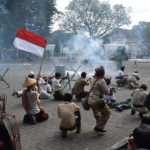 Arnoud Arps
Arnoud Arps
Remembering Violence: Memori melompat, popular culture, and the Indonesian War of Independence (2016-2022)
For the past few years, Indonesian popular culture has been structurally and continuously referring to its colonial past, particularly focusing on the Indonesian War of Independence (1945-1949). Performances of key battles of the war can be watched on city streets across the archipelago, as historical re-enactment groups have increased their activities in recent years. Indonesian war films have received widespread attention by releases in cinemas, school screenings, and through critical acclaim at national and international film festivals. As in many other genres, popular Indonesian nationalist songs have been released in electronic dance music. Leading to a growing online popularity, these songs remember the struggles and heroes of the war. Taking these three forms of contemporary popular culture – historical re-enactment, cinema, and music – as its object of study, this PhD-project investigates how cultural memories of the Indonesian War of Independence are produced, constructed, and consumed in Indonesia.
This project is supported by a NWO PhD in the Humanities grant. Supervision together with Leonie Schmidt.
Completed PhD Projects
 Sanne Albers
Sanne Albers
Dissecting the Chinese national historical narrative. A quantitative and qualitative analysis of ideological roles of women, ethnic minorities, and businesspeople in Chinese junior high school history textbooks (2017-2022)
Understanding China’s state ideology is a crucial step toward gaining a better understanding China’s former, current, and future positions in the world. This study, therefore, traces ideological changes from the founding of the People’s Republic of China (PRC) in 1949 until today, what the relationship is between these changes and the social context surrounding them, and what implications these changes have for China’s present and future, most notably for the legitimation of the rule of the Chinese Communist Party (CCP).
Instead of direct party-state explanations or policy documents, these guiding questions will be answered by making use of Chinese high school history textbooks. National historical narratives across the globe are continuously (re)constructed to fit changing ideological needs, and in China history education is even openly admitted to being crucial for instilling correct values and patriotic spirit. In addition, telling the ‘history of the nation’ inevitably requires facing ideological challenges, which can be skillfully evaded in more direct theoretical descriptions, as stories about people, places, and events are shaped.
Using a unique and innovative combination of quantitative and qualitative methods, this study is the first to include a near-complete set of 43 Chinese history textbooks since 1949 with a combined length of over 2.3 million characters. This methodology and scope have enabled the visualization of general patterns of ideological change based on frequencies and ‘keyness values’ of ideological concepts.
The rest of the study further dissects the national historical narrative by looking at the changing ideological ‘roles’ of three groups of people as they continuously appear throughout the textbooks, namely women, ethnic minorities, and businesspeople. Their appearances in the history textbooks change along with changing ideological needs and requirements, and it is argued that the ratio in which they appear in these different roles matters ideologically.
Funded by NWO, supervision together with Remieg Aerts.
 Esther Hammelburg
Esther Hammelburg
Being There Live: How Liveness is Realized Through Media Use at Contemporary Cultural Events (2015-2021)
Liveness is a key concern in media studies, yet has been mostly theorized as a phenomenon related to broadcasting and is understudied for the Internet and social media. This study is an appeal for preserving liveness as a concept that continuously evolves as new media technologies emerge. The thesis challenges media theory’s conceptualization of liveness as mediated presence to an unfolding reality that exists in and of itself. It asserts that this is not only an outdated understanding, but one that impedes comprehending what “truly being there live” means. Empirical observations and analysis reveal the constructive role live media practices play in realizing live instances. Live instances, this study suggests, are realized when event-joiners align their physical event environment and the various mediated contexts in which they are continuously involved as users of smartphones, social media, TV, and direct messaging apps. It is through their live media practices that they constitute their sense of “being there live” as “being now here together,” in relation to distant times, places, and others. By investigating how live instances are situated in both physical and mediated contexts, this study contributes to and shows valuable directions for future academic research. It also offers tools that can be used for innovating the design of future media and cultural events.
Funded by NWO, supervision together with Thomas Poell and José van Dijck.
 Arjen Nauta
Arjen Nauta
Governing Through Reality Television in Contemporary China: The Case of Hunan Satellite Television (2015-2021)
If the Chinese government still uses television for their own political purposes, then how? How can commercial imperatives (TV stations need to fend for their own revenues) coexist with the state-ascribed propagandistic function of television? What consequences does this have for production? And how do audiences react to it? If television needs to accede to stringent political requirements, and simultaneously generate income by advertisements and product placements, which is dependent on the eyeballs that programs manage to attract (i.e. satisfy audiences), then it seems that television makers need to navigate a social, political, economic, and cultural minefield. It is to these questions that I turn in this dissertation. Based in the provincial capital of Changsha, Hunan Satellite Television, the station that pioneered commercialization and entertainment programming, thereby forms a highly relevant and interesting case study. By taking HSTV as a case study, I engage with my main research question: How does governmentality work within and through Chinese reality television? How are political, economic, social, and cultural imperatives configured in the making and consumption of reality television?
Part of the ERC funded project ChinaCreative, supervision together with José van Dijck.
 Deng Zoénie Liwen
Deng Zoénie Liwen
“Be Water, My Friend”: Non-Oppositional Criticalities of Socially engaged art in Urbanising China (2015-2020)
This study attends to different forms of socially engaged artistic and cultural practices in China. These practices address a range of social issues in Chinese cities, including the progressive diminishment of spaces available for civil engagement, unequal treatment of migrant workers, and denigration of urban villages. Through anthropological fieldwork in 2015 and 2016 (with updates till 2019), and critical analysis, I explore how social practice art offers critical perspectives on these problematics in the context of the contemporary Chinese regime. In particular, I stress how arts practices in China have developed forms of criticality that avoid explicitly opposing the political authorities. I conceptualise four forms of entangled non-oppositional criticality: “reconfigurative criticality”, “connective criticality”, “uneasy criticality”, and “quotidian criticality”, respectively from the practices of Theatre 44 and Sunset Haircut Booth (2016-ongoing) in Guangzhou, Dinghaiqiao Mutual-Aid Society in Shanghai, documentary theatre Home (2016) in Beijing, and 5+1=6 (2014-2015) in Beijing. I argue that critical art can go beyond oppositional critique by being “a bit off”. By this, I mean that it can partially eschew the system—but not by entirely escaping or turning against it. Rather, these forms of criticality work by smuggling something external into the system (or something internal out of it); becoming “inappropriate/d”, embodying an alternative way of life; or working towards the otherwise in the future. This research tries to contribute to the discourse of criticality, and the discussion of socially engaged art in China and beyond.
Part of the ERC funded project ChinaCreative, supervision together with Sruti Bala.
 Laura Vermeeren
Laura Vermeeren
Inquisitive ink: A study of contemporary practices of calligraphy in China (2015-2020)
This study investigates contemporary practices of calligraphy in China. It starts by locating calligraphy, approached as both an act of writing and an art-form endowed with cultural and historical significance, in a precarious position as people are increasingly writing less due to digitization. At the same time, I demonstrate how calligraphic practices are increasingly prevalent due to current governmental directives that promote “creativity” as a powerful discourse contributing to economic and urban development. The consumption of calligraphy is further dispersed due to increased demand for nostalgic calligraphic content and private calligraphy education as well as the development of vernacular practices of calligraphy that are sprouting up in the grassroots. In this context, this dissertation unfolds how calligraphy is imagined, negotiated and performed in five different visual cultural fields in China: calligraphy education, water calligraphy in public parks, modern calligraphic art, digital calligraphy APPs, and WeChat groups and calligraphic font design.
Part of the ERC funded project ChinaCreative, supervision together with Stefan Landsberger.
 Rowan Parry
Rowan Parry
Parrhesia in the Age of the Ultra-unreal: Independent Non-fiction Filmmaking in 21st Century China (2015-2020)
Twenty-five years since the emergence of independent cinema in China, the film culture it initiated still exists. Independent Chinese cinema carves out an alternative space where official discourses are questioned, non-mainstream realities are represented, and a wide range of topics are openly discussed. It is this capacity of independent Chinese cinema to question official and mainstream truths, and to present alternatives in its production, content, and distribution that forms the focus of this study. Through four case studies, centred on the discourses used by independent Chinese filmmakers, the content of environmentally themed docu-fiction films, underground screenings in Beijing, and the dissemination of independent Chinese cinema at international film festivals, this study asks how independent Chinese cinema creatively and critically positions itself in contemporary China and what it means to speak truth to power (or, in Michel Foucault’s terms, to engage in parrhesia) in the age of the ultra-unreal.
Part of the ERC funded project ChinaCreative, supervision together with Esther Peeren.
 Wang Shuaishuai
Wang Shuaishuai
Living with Censorship: The Political Economy and Cultural Politics of Chinese Gay Dating Apps (2015- 2019)
This dissertation studies the political economy and cultural politics of Chinese gay dating apps, namely, Blued, Aloha, and ZANK. Unlike their Western counterparts such as Grindr and Jack’d whose functionalities are concentrated on location-based browsing, Chinese gay dating apps frequently integrate new features into their basic dating structures. Examples of which include live streaming, gaming, shopping, and overseas surrogacy consultation. Drawing on internet ethnographic data and interview data with their founders and users, this dissertation addresses two major questions. First, how do businesses based on gay dating apps develop amid close state surveillance? Second, how do users’ sexual and intimate desires shape and transform China’s digital pink economies and homosexual cultural politics? As China continues to problematize homosexuality in terms of obscenity and pornography in its regulatory documents, the booming economy of gay dating apps provides an entry point for rethinking the role of censorship in shaping Chinese gay lives. Using censorship as an analytical tool, I first show that Chinese gay dating apps can manoeuvre censorship in their favour to carry out economic activities. In this process, gay dating apps and the government become interdependent in the aspects of economic development, HIV/AIDS prevention, and internet security. I then examine how censorship has been woven into the everyday use of gay dating apps. As censorship increasingly disciplines users’ dating and live streaming activities, it has also inspired creative ways to satisfy their same-sex sexual/emotional needs in a regulatory environment. Together, this study shifts the focus in thinking about China’s homosexual cultural politics from identity formation, community organization, and media (mis)representation to the everyday sexual and emotional desires and related personal and bodily performances afforded by gay digital platforms.
Funded by the Chinese Scholarship Council and part of the ERC funded project ChinaCreative, supervision together with Rachel Spronk.
 Lin Jian
Lin Jian
Schizoid Creators: Creative Work and Subjectivity in the Chinese Cultural Economies (2015–2019)
This study investigates creative labour conditions and the formation of creative subjectivities in China. Based on my empirical fieldwork in China (mostly Beijing and Shanghai) and archival research (e.g. policy documents and industrial reports), this study combines a political economy of cultural production in contemporary China with four empirical case studies focusing on creative workers in state-owned cultural enterprises, independent filmmakers, international creative workers and the newly emerged digital creative class on social media. By investigating the subjectivation of creative workers in relation to the complex and diversified labour conditions of cultural production in contemporary China, this study engages with questions concerning governance, precarity and subjectivity of creative labour. While unveiling how politico-economic inequalities are concealed by the production of creative aspirations in the Chinese cultural industries, I also attempt to affirm the experiences and agency of individuals working in a wide range of cultural sectors, including television, film, design, journalism and social media. These creative subjects, I argue, are far from docile bodies that are simply manipulated by (state) capitalist ideologies. China’s specific cultural economy produces space for individual agency as well as precariousness, leaving open the possibility for cultural workers to become what I term ‘schizoid creators’ – a concept borrowed and developed from Deleuze and Guattari’s schizoanalysis of contemporary capitalism (1983). Such schizoid creators are working both for and against the system. The vibrant network of cultural production in China both pushes and limits individuals’ aspirations to creativity and self-realisation. Expected by the state and market to always ‘be creative’ in particular ways, cultural workers also find possibilities to resist this imperative, developing a schizoid subjectivity that serves the governing system but challenges it at the same time.
Funded by the Chinese Scholarship Council and part of the ERC funded project ChinaCreative, supervision together with Esther Peeren.
 Selçuk Balamir
Selçuk Balamir
Beyond the commodity-machine: The production of the common in post-capitalist design cultures (2013-2017)
Design cultures have so far been analysed in separate stages of production, mediation and consumption, or, along the circuit of the ‘commodity-machine’ —an unsustainable configuration vulnerable to multiple crises. Emergent ‘postcapitalist’ design cultures bypassing market mediation require a different framework, based on the production of shared value, as opposed to exchange value. Three ‘commoning’ strategies are distinguished: a) peer production, in the activity of designing subjects, b) open source, in the circulation of design projects, c) digital fabrication, in the making of designed objects. To what extent these practices prefigure a new and sustainable basis for product design, and redirect the production and distribution of material artefacts towards viable, desirable and equitable configurations?
Supervision together with Johan Hartle and Joost de Bloois.
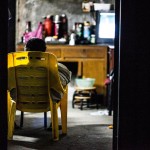 Penn Tsz Ting Ip
Penn Tsz Ting Ip
Affect and Urbanity: Single Migrant Women’s “Home” in Shanghai (2013-2017)
Part of the HERA project “Creating the ‘New’ Asian Woman: Entanglements of Urban Space, Cultural Encounters and Gendered Identities in Shanghai and Delhi”
Currently, there are 262 million rural-to-urban migrant workers in China. As China’s most cosmopolitan city, Shanghai’s population comprises more than 3 million migrant women. Central to my project is the study of the mediation, construction and composition of the working-class single migrant woman’s “home”. The project’s objective is to unfold the ways in which this “home” is being mediated and how the single women construct and compose it, thereby not only shaping, modifying, and manipulating their intimate lives (particularly at the affective level), but also allowing for moments of agency and sites of empowerment in the era of precariousness. In terms of existing scholarship, the topic of migrant women has attracted a fair amount of research, which, however, mainly focuses on these women as economically exploited victims in a global capitalist system. Their intimate lives and their negotiation of city spaces have been largely neglected. I employ affect theory to discern, interrogate, and analyse single migrant women as affective / exploring beings.
Supervision together with Esther Peeren.
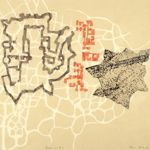 Simon Ferdinand
Simon Ferdinand
Map Art: Alternative Visions of Globalisation (2012-2016)
The use of cartography as the formal and thematic substance of artistic production is an increasingly recognised and widespread tendency that has emerged and established itself over the last century. Transgressing received boundaries and submitting so constitutively modern a visual apparatus as the map to often withering aesthetic and conceptual play, ‘map art’ has frequently been produced and construed as congruent both with waves of ‘globalisation’ and with the moment of ‘postmodernism’ in culture at large.
My project aims to determine the place of this distinctive and rapidly developing form of practice within the ideological and rhetorical milieu of ‘globalisation’ and related cultural categories, and to thereby tease out, ground and subject some of its prevailing assumptions and formal tendencies to critical scrutiny. I am particularly concerned to put pressure on the conception of map art as a postmodern disavowal of the power and authority of cartography by emphasising the critical and constructive impulses within the genre: the ways in which artists have deployed cartography as a means with which to produce alternative geo-political visions or generate microcosms of omnipotence.
Supervision together with Esther Peeren.
 Irene Villaescusa
Irene Villaescusa
Hispano Filipino Literature in a Global Context: (Post)Colonialism, Modernity and Spectrality (2013-2017)
Zapatos, cuchara, platito, puede, gusto, solidaridad … ‘[shoes, spoon, little plate, can, to like, solidarity]…’ These words are used by most Filipinos in and outside the Philippines, although most people are unaware of their origin, especially young generations, for whom it is simply the way of speaking. Three hundred years of Spanish colonial rule and another fifty of American occupation have produced a complex and interesting process of transculturation in the Philippines that Magellan would have never foreseen when he landed in Cebu in 1521. The impact of global forces have transformed Filipino society into a genuine hybrid of multilingual, multiethnic and pan-religious components embodied in a traditional but modern culture in which the Hispanic holds an intriguing spectral position.
In this study I focus on the political and cultural perspective of Hispano-Filipino writers after Jose Rizal with regard to the configuration of Filipino identity. The main aim of this research is to discover what discourses characterized the heyday of Hispano Filipino literature from 1900 until 1950 and how it positioned (and continues to position) itself in relation to Hispanic and transnational literature. I use the concept of transculturation as a productive term that acknowledges the agency of the local in order to analyze the interplay of multiple cultural influences (Hispanic, European, American and Asian) that the Hispano Filipino literature of this period engaged with. I will assess how Hispano-Filipino literary imagination constructed and mediated local, national and global histories in order to establish a specific discourse governing the imagined communities and the (g)local realities of the Philippines.
Supervision together with Esther Peeren.
 Melanie Schiller
Melanie Schiller
Soundtracking Germany (2008-2014)
Germany is a nation with a particularly traumatic history, and discourses on Germanness are always infused with references to that collective past. In order to understand the workings and imaginations of national identity in conjunction with the issue of social memory, I want to investigate popular music representations and constructions of Germanness from 1945 till today, and analyse how changing notions of the past have morphed into a contemporary new German pride.
Supervision together with Jaap Kooijman.
 Adiel Portugali
Adiel Portugali
Marginal Sounds: The Story of Jazz in China – Music, Culture and Space in Contemporary China (2009-2014)
The research intends to unfold the story of jazz in China. The idea is to examine the current jazz scene in China as a case study of an off-center phenomenon, which takes place in the margins of its popular culture and music industry. The research aims to expose the insider’s view of the way jazz is experienced in China, that is to say, the view of the musicians and the individuals who introduced and are introducing it into China. The choice of jazz in this study is a consequence of (1) its specific history and current position in China; (2) the significant role it plays as a marginal musical style and phenomenon; (3) its unique cultural and spatial characteristics. Methodologically, the study is based on empirical-qualitative research methods, such as, in-depth interviews, regular and participatory observations, and on an interdisciplinary theoretical ground, which involves the fields of cultural, spatial, and ethnomusicology studies. Accordingly, by revealing the story of jazz in China the study aims to raise and develop the following key questions: What are the cultural, social and individual significances of jazz in China? Does Chinese jazz enclose unique spatial and cultural characteristics? And above all, what role does jazz in China plays today as an off-center musical and cultural scene?
Adiel Portugali is affiliated to the Department of East-Asian Studies, Tel-Aviv University, Israel, supervision together with Shahar Meir.
 Leonie Schmidt
Leonie Schmidt
Visions of the future: imagining Islamic modernities in post-Suharto visual culture (2009-2014)
Indonesia is home to the world’s largest Muslim population and in the midst of modernization and Islamization. Indonesian Islamic visual culture both displays and constructs Islamic modernities. This is relatively recent, as expressions of religion in popular culture were banned during the Suharto regime (1965-1998). Now, in the post-Suharto era (1998-), Indonesia’s Muslim community takes advantage of the newly liberated public sphere to participate in public discourses related to the alleged path of modernity. Simultaneously, entrepreneurs instill cultural products with spiritual and economic value. The dialectics between a public Islamic revival and a commodification of Islam results in a booming Indonesian cultural sphere, that is a key site to experiment with Islamic modernities. This PhD project analyses how through practices of Indonesian visual and popular culture, Islamic modernities are imagined, negotiated and contested, while global modern urban Islamic futures in a post 9/11 world are projected. Case studies include Islamic rock music (videos), art, cinema, self-help books, urban space and shopping malls. [Link]
Supervision together with Pamela Pattynama.
 Guohua Zeng
Guohua Zeng
The Making of China: the Construction of Chineseness in the Opening Ceremony of the Beijing Olympics (2009-2013)
Although quite some academic works emphasize the importance of the Opening Ceremony of the Beijing Olympics in articulating an “ideal China”, few studies so far have scrutinized what was exactly constructed in the Opening Ceremony and how. I propose that the construction of the ideal China in the Opening Ceremony of the Beijing Olympics both to the world and to the people inside China can arguably be summarized as a strategic construction of a “new” set of Chineseness. In this project, I examine how this new version of Chineseness was constructed and mediated in the context of the rise of China, and how it was perceived, responded, and contested in the media, with a focus on television, in Anglo-America (as examples of media in the global context), Hong Kong and Taiwan (as examples of regional media), and on the Internet in mainland China. With the examination, I reflect on the diversity and borderlines, as well as theoretical and practical limitations, of the concept of Chineseness in the globalized world. Finally, I call for new ways for Chinese identity construction and national image (or soft power) building, and more de-imperialized communication tactics and strategies between mainland China, and Hong Kong, Taiwan, and the Western societies.
Supervision together with José van Dijck.
 Gladys Pak Lei Chong
Gladys Pak Lei Chong
China Rejuvenated?: Governmentality, Subjectivity and Normativity. The 2008 Beijing Olympic Games (2007-2012)
This study of the Beijing Olympics moves beyond the narrowly construed idea of coercive or oppressive power to look at the broader ruling strategies that shape the behavior of individuals. The multifaceted strategies, tactics, and discourses deployed by the Chinese authorities sustain an order of things and values in such a way that it drives individuals to commit themselves actively to the goals of the party-state. This dissertation examines how this process of subjectification is achieved. In other words, I examine the processes under which individuals become self-directed subjects of their own and whereby they internalize state-defined norms/ideals in their belief to embrace the nation’s dream. In such processes of subjectification, media play a key role. A number of studies have highlighted the instrumentality of the media for the party-state as well as the centrality of new and old media to the Chinese population. In addition, through engaging with Foucaultian concepts and analyses, I also seek to reflect upon the questions of what China means for Foucault, what Foucault means for China, and what this interrogation adds to knowledge-production in China studies. In this research, I combine various qualitative research methods with theoretical insights. The five case studies are informed by theorists ranging from Walter Benjamin and Judith Butler to Michel Foucault and Ackbar Abbas. Meanwhile, my analysis draws upon ample empirical data I collected during my extensive fieldwork. [Link]
Supervision together with Stefan Landsberger.
